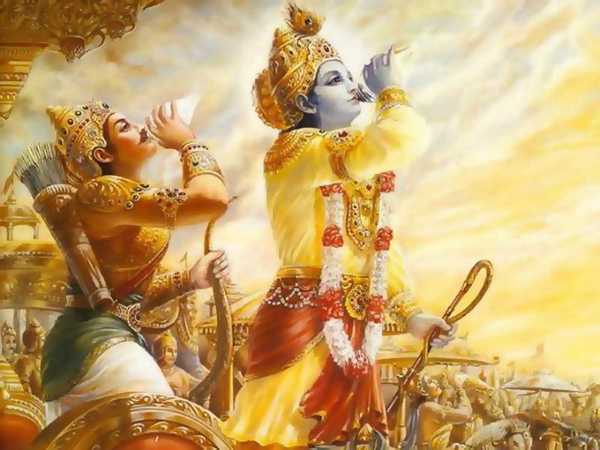Chapter 192

Vaisampayana said, “The Rishis, the Brahmanas, and Yudhishthira thenasked Markandeya, saying, ‘How did the Rishi Vaka become so long lived?’
“Thus asked by them, Markandeya answered, ‘The royal sage Vaka is a greatascetic and endowed with long life. Ye need not enquire into the reasonof this.’
“Hearing this, O Bharata, the son of Kunti, king Yudhishthira the just,along with his brothers, then asked Markandeya saying, ‘It hath beenheard by us that both Vaka and Dalvya are of great souls and endowed withimmortality and that those Rishis, held in universal reverence, are thefriends of the chief of the gods. O Holy One, I desire to listen lo the(history of the) meeting of Vaka and Indra that is full of both joy andwoe. Narrate thou that history unto us succinctly.’
“Markandeya said, ‘When that horrible conflict between the gods and theAsuras was over, Indra became the ruler of the three worlds. The cloudsshowered rain copiously. And the dwellers of the world had abundance ofharvests, and were excellent in disposition. And devoted to virtue, theyalways practised morality and enjoyed peace. And all persons, devoted tothe duties of their respective orders, were perfectly happy and cheerful,and the slayer of Vala, beholding all the creatures of the world happyand cheerful, became himself filled with joy. And he of a hundredsacrifices, the chief of the gods seated on the back of his elephantAiravata, surveyed his happy subjects, and he cast his eyes on delightfulasylums of Rishis, on various auspicious rivers, towns full ofprosperity, and villages and rural regions in the enjoyment of plenty.And he also cast his eyes upon kings devoted to the practice of virtueand well-skilled in ruling their subjects. And he also looked upon tanksand reservoirs and wells and lakes and smaller lakes all full of waterand adored by best of Brahmanas in the observance, besides, of variousexcellent vows, and then descending on the delightful earth, O king, thegod of a hundred sacrifices, proceeded towards a blessed asylum teemingwith animals and birds, situated by the side of the sea, in thedelightful and auspicious regions of the East on a spot overgrown withabundance of vegetation. And the chief of the gods beheld Vaka in thatasylum, and Vaka also, beholding the ruler of the Immortals, becamehighly glad, and he worshipped Indra by presenting him with water to washhis feet, a carpet to sit upon, the usual offering of the Arghya, andfruit and roots. And the boon-giving slayer of Vala, the divine ruler ofthose that know not old age, being seated at his ease, asked Vaka thefollowing question, ‘O sinless Muni, thou hast lived for a hundred years!Tell me, O Brahmana, what the sorrows are of those that are immortal!’
Markandeya continued, “Hearing this, Vaka answered, saying, ‘Life withpersons that are disagreeable, separation from those that are agreeableand beloved, companionship with the wicked, these are the evils whichthey that are immortal have to bear. The death of sons and wives, ofkinsmen and friends, and the pain of dependence on others, are some ofthe greatest of evils. (These may all be noticed in a deathless life).There is no more pitiable sight in the world, as I conceive, than that ofmen destitute of wealth being insulted by others. The acquisition offamily dignity by those that have it not, the loss of family dignity bythose that have it, unions and disunions,–these all are noticeable bythose that lead deathless lives. How they that have no family dignity buthave prosperity, win what they have not–all this, O god of a hundredsacrifices, is before thy very eyes! What can be more pitiable than thecalamities and reverses sustained by the gods, the Asuras, theGandharvas, men, the snakes, and the Rakshasas! They that have been ofgood families suffer afflictions in consequence of their subjection topersons that are ill-born and the poor are insulted by the rich. What canbe more pitiable than these? Innumerable examples of such contradictorydispensations are seen in the world. The foolish and the ignorant arecheerful and happy while the learned and the wise suffer misery!Plentiful instances of misery and woe are seen among men in this world!(They that lead deathless lives are destined to behold all these andsuffer on that account.)’
“Indra then said, ‘O thou of great good fortune, tell me again, what thejoys are of those persons that lead deathless lives,–joys that areadored by gods and Rishis!’
“Vaka answered, ‘If without having to associate with a wicked friend, aman cooks scanty vegetables in his own house at the eight or the twelfthpart of the day, there can be nothing happier than that.[49] He in whosecase the day is not counted is not called voracious. And, O Maghavan,happiness is even his own whose scanty vegetables are cooked. Earned byhis own efforts, without having to depend upon any one, he that eatetheven fruits and vegetables in his own house is entitled to respect. Hethat eateth in another’s house the food given to him in contempt, even ifthat food be rich and sweet, doth what is despicable. This, therefore, isthe opinion of the wise that fie on the food of that mean wretch who likea dog or a Rakshasa eateth at another’s house. If after treating guestsand servants and offering food to the manes a good Brahmana eateth whatremains, there can be nothing happier than that. There is nothing sweeteror more sacred, O thou of a hundred sacrifices, than that food which sucha person takes after serving the guest with the first portion thereof.Each mouthful (of rice) that the Brahmana eats after having served theguest, produces merit equal to what attaches to the gift of a thousandkine. And whatever sins such a one may have committed in his youth areall washed away of a certainty. The water in the hands of the Brahmanathat hath been fed and honoured with a pecuniary gift (after the feedingis over) when touched with water (sprinkled by him that feeds), instantlypurges off all the sins of the latter!'”
“Speaking of these and various other things with Vaka, the chief of thegods went away to heaven.'”[50]




